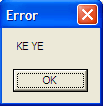TSPY_KEYLOG.AL
Trojan:WIn32/Dynamer!dtc (Microsoft); Hacktool.Keylogger (Symantec); Trojan.Win32.Zapchast.jdy (Kaspersky); Generic.dx!bafj (Mcafee)
Windows 2000, Windows XP, Windows Server 2003


Threat Type: Spyware
Destructiveness: No
Encrypted: No
In the wild: Yes
OVERVIEW
This spyware arrives on a system as a file dropped by other malware or as a file downloaded unknowingly by users when visiting malicious sites. It arrives as a component bundled with malware/grayware packages.
It may be injected into processes running in memory.
It does not have any propagation routine.
It does not have any downloading capability.
It logs a user's keystrokes to steal information.
It exports functions used by other malware. It requires its main component to successfully perform its intended routine.
TECHNICAL DETAILS
Arrival Details
This spyware arrives on a system as a file dropped by other malware or as a file downloaded unknowingly by users when visiting malicious sites.
It arrives as a component bundled with malware/grayware packages.
Installation
This spyware may be injected into processes running in memory.
Propagation
This spyware does not have any propagation routine.
Dropping Routine
This spyware drops the following file(s), which it uses for its keylogging routine:
- C:\recycler\suc.sys
- C:\recycler\tcp.dll
Download Routine
This spyware does not have any downloading capability.
Information Theft
This spyware logs a user's keystrokes to steal information.
Other Details
This spyware exports functions used by other malware.
It requires its main component to successfully perform its intended routine.
NOTES:
This spyware may log keystrokes that may be used to steal user credentials such as user names and passwords from sites accessed on the affected system.
It displays the following message boxes:

It does not have rootkit capabilities.
It does not exploit any vulnerability.
SOLUTION
Step 1
For Windows XP and Windows Server 2003 users, before doing any scans, please make sure you disable System Restore to allow full scanning of your computer.
Step 2
Search and delete these files
- C:\recycler\suc.sys
- C:\recycler\tcp.dll
Step 3
Restart in normal mode and scan your computer with your Trend Micro product for files detected as TSPY_KEYLOG.AL. If the detected files have already been cleaned, deleted, or quarantined by your Trend Micro product, no further step is required. You may opt to simply delete the quarantined files. Please check this Knowledge Base page for more information.
Did this description help? Tell us how we did.


